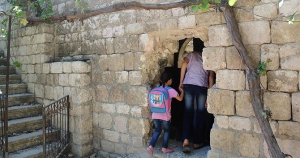The best way to undermine the Islamic State is through state-building, aid, and public economy, says a research paper from LSE’s Department of International Development. Originally posted on Middle East Eye.

Dynamic state-building and practical aid, not bombing, would be the most effective ways of combating IS in Syria, two research papers by the London School of Economics have said.
According to the research, based on more than 100 in-depth interviews with people living in three opposition-held areas, well-paid salaries and the ability to restore law and order would heavily undercut the influence of IS.
The LSE reports indicated that these two factors – as well as its ability to provide state services – have fueled IS’s rise and would therefore help to undermine support for the group.
Those interviewed confirmed that despite its violence and cruelty, IS had provided clean, well-run hospitals and helped to improve security. It also lured men to its ranks given the staggering unemployment rate that is as high as 80 percent in some areas, the study found.
The traditional job industry, which included agriculture, tourism, public sector and small-scale industry, severely diminished after the outbreak of the Syrian conflict in March 2011.
The resulting “war economy” is steeped in bribery and extortion, in addition to smuggling of people, antiquities and fuel.
The lack of fuel in non-IS rebel-held areas is further intensifying the problem, the report said. According to the research, as oil and gas are not produced in opposition areas, local authorities, people and militias have all been forced to buy supplies from either the government or IS, thereby inadvertently strengthening their opponents.
“Syria is being destroyed by its own resources, which are being used to fund the war rather than the public good,” said Dr Rim Turkmani, a research fellow in the Department of International Development at LSE.
“Civilians are suffering beyond imagination because of the networks of war-profiteers that include armed actors and their business associates from all sides.”
“They are having to indirectly pay such networks and even ISIL when they cook their food, as even home use gas is only available in the black market which benefits these actors,” she added using another name for IS.
Mary Kaldor a Professor of Global Governance said: “Our research shows that ISIL is a product of war and state collapse. The only way to prevent further [IS] expansion is through the construction of a legitimate government and a legitimate economy.”
The studies also urged international organisations and local groups to work to revive agriculture, economic development and education, rather than relying solely on humanitarian aid, as part of any anti-IS strategy.
Read more about the latest papers from the Security in Transition team at LSE.
Related Posts
 ![Flag on the Wall, Israel. Photo Credit: Jack Zallum, via Flickr [https://www.flickr.com/photos/kaiban/7771323676/] License: CC BY-NC 2.0](https://blogstest.lse.ac.uk/internationaldevelopment/files/2015/08/Flag-on-the-Wall-300x159.jpg)  |






1 Comments